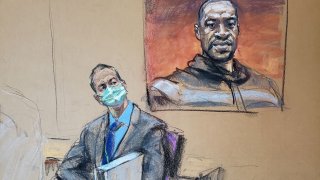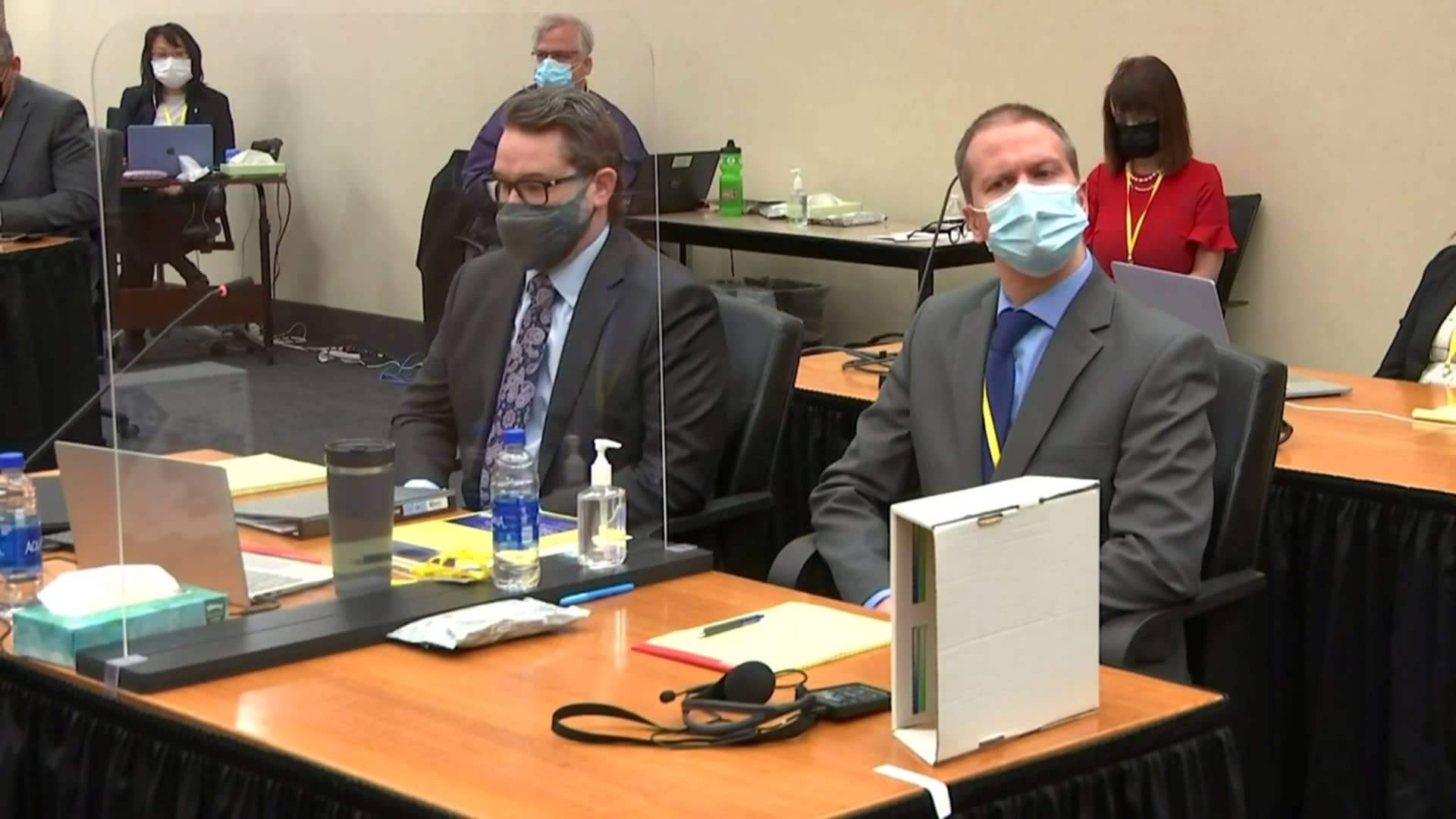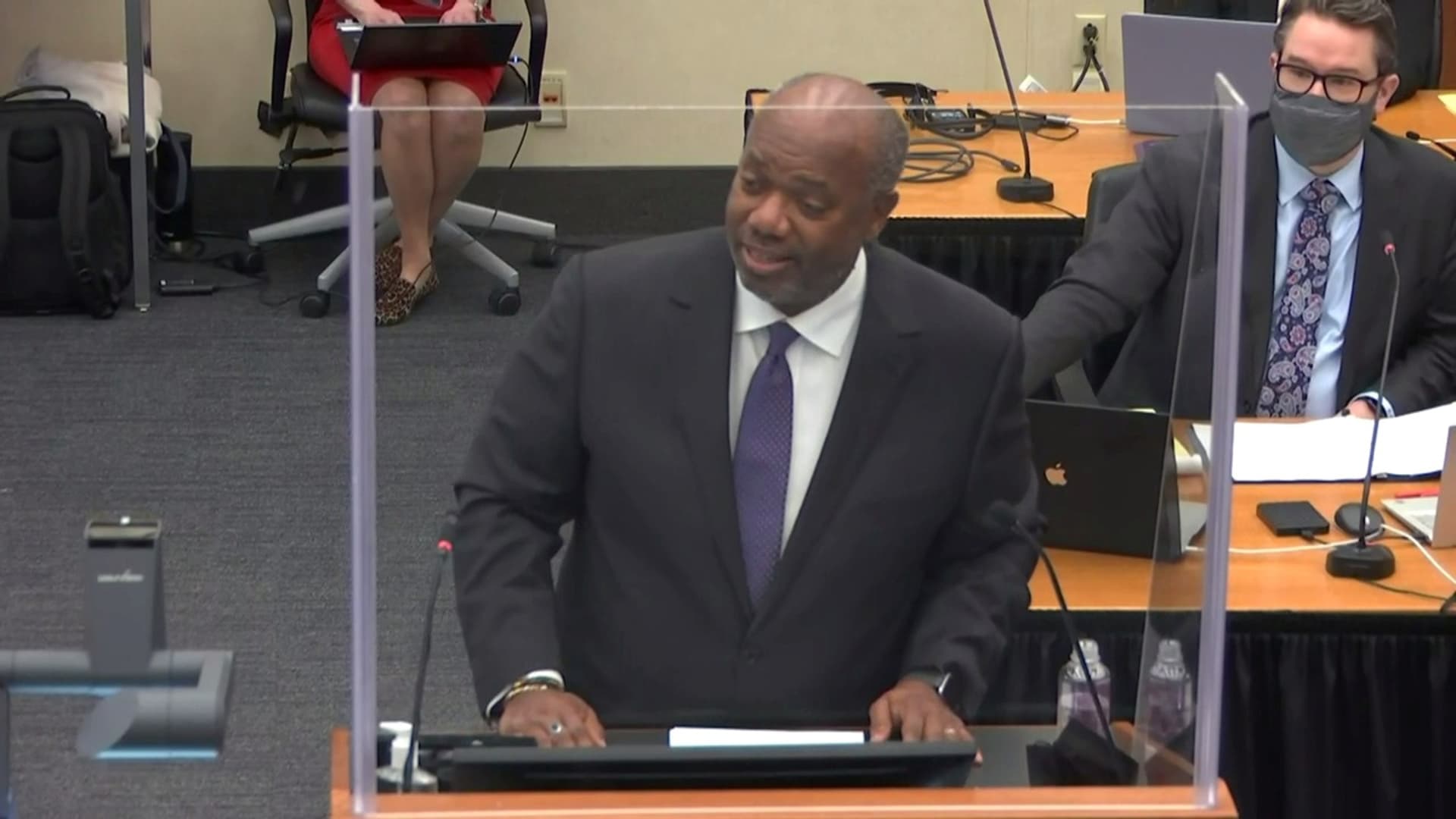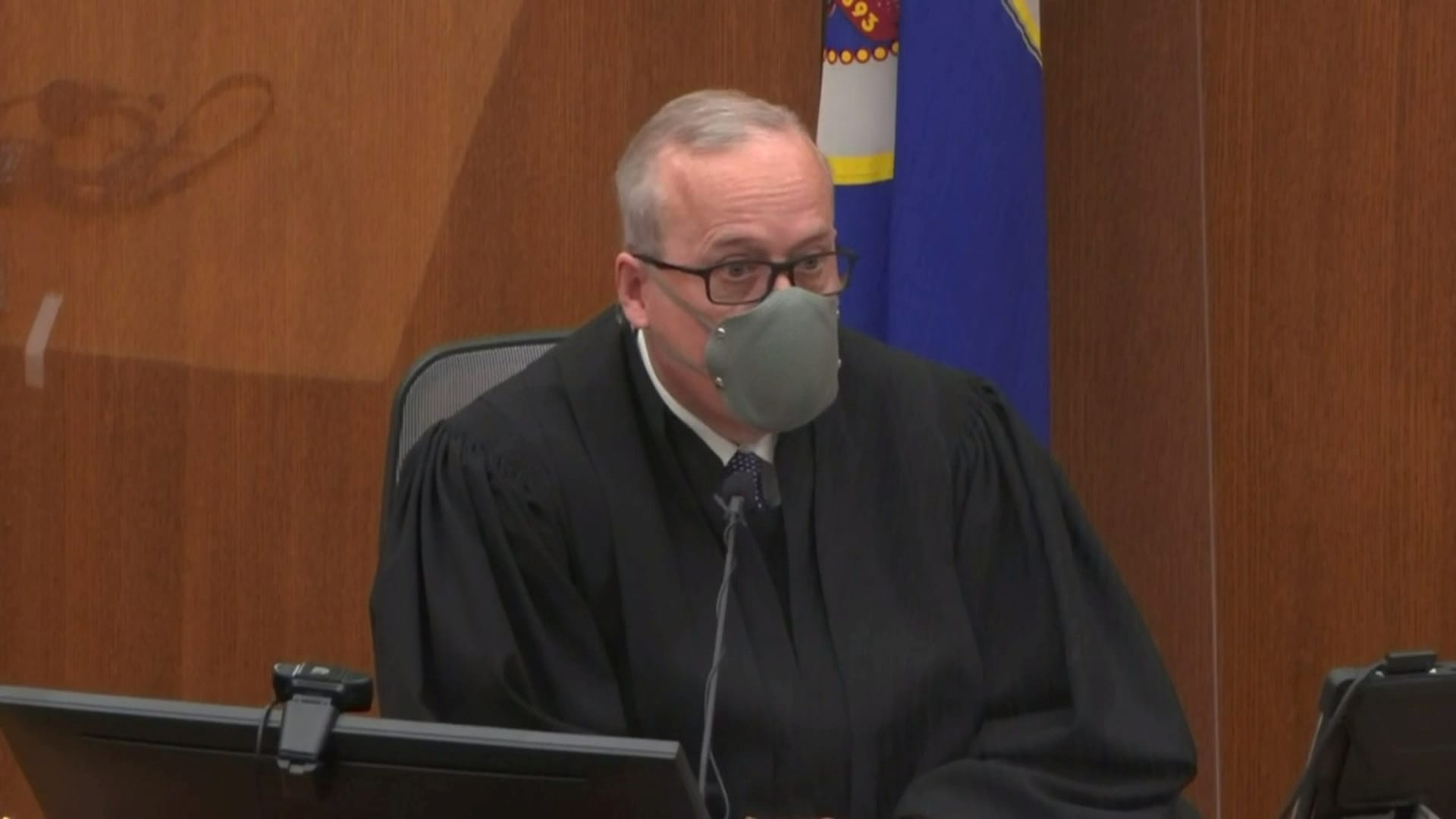
- Opening statements in the trial of Derek Chauvin began, 10 months after the white former Minneapolis police officer was recorded kneeling on George Floyd's neck before he died, spurring months of protests nationwide.
- Chauvin faces charges of second- and third-degree murder and second-degree manslaughter.
- The historic case comes amid a push by racial justice advocates, particularly those affiliated with the Black Lives Matter movement, to hold police accountable for unlawful violence against Black people.

Opening statements in the trial of Derek Chauvin began Monday, 10 months after the white former Minneapolis police officer was recorded kneeling on George Floyd's neck before he died, spurring months of protests nationwide.
Chauvin, 45, faces charges of second- and third-degree murder and second-degree manslaughter. Court staff have said the trial is expected to last about two to four weeks. Chauvin has pleaded not guilty.
Get Tri-state area news and weather forecasts to your inbox. Sign up for NBC New York newsletters.
The historic case comes amid a push by racial justice advocates, particularly those affiliated with the Black Lives Matter movement, to hold police accountable for unlawful violence against Black people.
Prosecutor Jerry Blackwell, speaking from behind a sheet of plexiglass, said in his opening remarks that Chauvin caused Floyd's death and acted well outside the bounds of his job when he refused to "let up" and "get up" for more than nine minutes.
"Derek Chauvin betrayed his badge when he used excessive and unreasonable force upon the body of Mr. George Floyd," Blackwell told the jury.
Money Report
Blackwell was followed by defense attorney Eric Nelson, who aimed to separate the case from Floyd's status as an activist symbol while introducing the concept of a reasonable doubt to the jurors.
"There is no political or social cause in this courtroom," Nelson said.
"The evidence is far greater than nine minutes and 29 seconds," he said, before arguing that Chauvin's conduct with Floyd constituted "exactly what he had been trained to do over the course of his 19-year career."
The trial is taking place in Minneapolis and is closed to the public, though it is being streamed live, at Chauvin's request, a first for a criminal trial in Minnesota.
Outside the courthouse, advocates for Floyd, including his family members and civil rights activist Rev. Al Sharpton, marked the start of the trial by kneeling for eight minutes and 46 seconds — the now-symbolic figure initially reported to be the amount of time that Chauvin held his knee on Floyd's neck.
"The whole world is watching," Floyd family attorney Benjamin Crump told reporters.
Three other former officers connected to Floyd's May 25 arrest, Thomas Lane, Alexander Kueng and Tou Thao, will face a separate trial in August. Those officers have pleaded not guilty to aiding and abetting second-degree murder and manslaughter.
The jury in Chauvin's case was selected earlier this month, a process that concluded on Tuesday. In all, 15 jurors were selected, including two alternates. Twelve jurors will deliberate. One juror will be dismissed if all 15 are ready when arguments begin, Hennepin County Judge Peter Cahill, who is presiding over the trial, has said.
Nine of the jurors are white, four are Black, and two are multiracial, The Associated Press reported. There are nine women and six men on the jury. While jury selection was underway, Minneapolis announced it had reached a $27 million deal to settle a lawsuit against it brought by Floyd's family.
White House press secretary Jen Psaki said Monday afternoon that President Joe Biden will be updated on developments in Chauvin's trial.
"He certainly will be watching closely," Psaki said at a press briefing, noting that Biden had previously spoken of Floyd's death as "being an event that really opened up a wound in the American public."
The trial began around 10 a.m. ET.
What is Derek Chauvin accused of doing?

Floyd, who was 46 when he died, was arrested on Memorial Day by Lane and Kueng on the suspicion that used a counterfeit $20 bill at a Minneapolis Cup Foods.
After Floyd refused to get in squad car, Thao and Chauvin arrived on the scene and struggled to get him in the vehicle. Chauvin ultimately pulled Floyd from the car and Floyd "went to the ground face down and still handcuffed," according to a complaint filed by prosecutors.
Once Floyd was on the ground, Chauvin placed his knee on Floyd's neck while Kueng and Lane assisted in holding him down. Floyd urged him to get off, calling out to his deceased mother and saying that he couldn't breathe more than 20 times.
About six minutes after Chauvin first placed his knee on Floyd's neck, Floyd became nonresponsive, according to prosecutors. At one point, Kueng attempted to locate a pulse but was unable to do so. Shortly afterward, an ambulance arrived and Floyd was taken to the hospital where he was pronounced dead.
In court papers, prosecutors wrote that officers held Floyd "about five times longer than the national anthem, and four times longer than President Lincoln's Gettysburg Address."
"During that time, Chauvin continued to kneel on Floyd's neck for about four minutes after Lane told the other officers that Floyd was 'passing out,' and for 2½ minutes after Kueng said Floyd did not have a pulse," they wrote.

"As Floyd lost consciousness, a crowd of bystanders pleaded with the officers. They told the officers they were killing Floyd. They screamed that Floyd had stopped moving," the prosecutors added.
The Hennepin County medical examiners officer, which examined Floyd's body, concluded that his manner of death was a homicide and that it was caused by "cardiopulmonary arrest complicating law enforcement subdual, restraint, and neck compression."
The autopsy report also revealed that Floyd had underlying health conditions and drugs in his system, including fentanyl and methamphetamine, that contributed to his death.
Gov. Tim Walz, a Democrat, appointed the state's attorney general, Keith Ellison, also a Democrat, to oversee Chauvin's prosecution.
Chauvin was initially charged with third-degree murder, which carries a maximum sentence of 25 years. Ellison added the second-degree charge in early June, which has a maximum penalty of 40 years.
What is Chauvin's defense?

In court papers Chauvin's attorney, Eric Nelson, has written that Chauvin was "acting within his duties to execute a legitimate legal process."
Nelson has argued that the state cannot prove that Chauvin caused Floyd's death, citing the quantities of narcotics that were in Floyd's system at the time of his autopsy.
In a filing, Nelson writes that the most likely cause of Floyd's death was fentanyl, likely exacerbated by his other health problems.
"His heart was at the 'upper limit of size' due to untreated hypertension. Mr. Floyd suffered from arteriosclerotic and hypertensive heart disease. He told officers that he had suffered from COVID-19 and was still positive for the virus at the time of his death," Nelson wrote.
Nelson has also argued that the technique that Chauvin used in order to restrain Floyd with his knee was included in Minneapolis Police Department training materials. According to Nelson, Floyd was "actively resisting arrest."
"Under MPD's use of force policy at the time, when a subject is actively resisting, officers are trained to use controlled take-downs and conscious neck restraints to subdue the subject," Nelson wrote.
Nelson added that the technique was made more dangerous by Floyd's health conditions and drug use, but that Chauvin did not know about either at the time of the arrest.
"Instead, he relied on his training and the information available to him to try and assist his fellow officers and to prevent Mr. Floyd from harming himself. Derek Chauvin did not cause George Floyd's death," he wrote.
Prosecutors, including Ellison and Neal Katyal, a high-profile Washington lawyer working for Minnesota, have rejected those arguments.
They have said that Floyd was "lucid" during the arrest and unlikely to have been suffering from a fentanyl overdose. They have also argued that the amount of fentanyl detected in the body increases significantly after death.
Floyd, Ellison wrote, "told Chauvin twenty times that he could not breathe and repeatedly yelled that it was Chauvin's knee on his neck that was killing him."
In court papers, prosecutors also argued that the technique used by the officers in Floyd's arrest was different than the one included in police officer training.
Subscribe to CNBC Pro for the TV livestream, deep insights and analysis on how to invest during the next presidential term.






